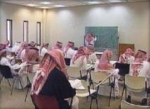18 February 2007
10,000 Saudi Students on US Campuses
 (cnsnews.com) Two years ago President Bush and Saudi Arabia's then Crown Prince Abdullah jointly called for a greater exchange of students, but recent...
(cnsnews.com) Two years ago President Bush and Saudi Arabia's then Crown Prince Abdullah jointly called for a greater exchange of students, but recent...
(CNSNews.com) - Two years ago President Bush and Saudi Arabia's then Crown Prince Abdullah jointly called for a greater exchange of students, but recent revelations of a terror plot and a history of lax screening have raised concerns about the nearly 10,000 Saudis in the United States on student visas.
The visa figures from the U.S. Immigrations and Customs Enforcement were revealed less than a month after the Defense Intelligence Agency issued an unclassified statement that said al Qaeda's Iraq faction considered using student visas to get more than a dozen operatives into the United States.
U.S. officials told media organizations the plan was in its early stages and that none of the operatives had entered the United States.
Considering that 15 of the 19 9/11 hijackers were Saudis and some had been issued student visas, the new information on Saudi student visa numbers is highly relevant, said Chris Farrell, director of investigations and research for Judicial Watch.
The government watchdog obtained the numbers from ICE through the Freedom of Information Act.
"The correlation here is very relevant" to the reports of the al Qaeda plot, Farrell told Cybercast News Service.
"Expanding student travel sounds fine assuming there have been corrections to the visa program. But we know there are innumerable problems with the visa program, including visa fraud and manipulation," he said.
"If you have 10,000 Saudis in the country, the American people need to know about it," Farrell continued. He acknowledged that "if 15 of the hijackers were not from Saudi Arabia, we wouldn't even be talking about this."
The precise numbers from ICE were 9,952 "active Saudi Arabian students" in the United States. There are a total of 611,581 foreign students in the United States, according to ICE.
Almost two years ago, the U.S. agreed to allow up to 21,000 Saudi students into the United States. A spokesman with the Saudi embassy in Washington could not be reached for comment this week.
In a joint statement on April 25, 2005, Bush and Abdullah said the two countries "agree that our future relations must rest on a foundation of broad cooperation. We must work to expand dialogue, understanding and interaction between our citizens. This will include programs designed to ... increase the number of young Saudi students to travel and study in the United States."
Acquiring a student visa can be a rigorous process involving fingerprinting, background screening and interviewing, according to the U.S. State Department's website.
It begins with requiring documentation from the school the student will attend stating how long the course or program will be. Also, students must supply past school transcripts, test scores and similar material.
When a student has a visa, the Student Exchange Visitor Information System (SEVIS) must inform government agencies that have an interest regarding foreign students, including the State Department and Department of Homeland Security.
SEVIS determines if a student stops attending class or otherwise violates a visa, when their visa expires and other matters.
After 9/11, students seeking to come to the United States were required to apply earlier because of new screening methods, the website says.
A lax system could be a threat in the United States if evidence from Europe is any guide.
According to a Nixon Center expert in 2005, 60 percent of terrorists who entered Europe in the previous decade did so via student visas.
While caution is advised with regard to student visas, strict cuts on the number of student visas would be shortsighted from a national security standpoint, said David Schanzer, director of the Triangle Center on Terrorism and Homeland Security at Duke University.
"There are two perspectives. You must scrutinize with care to be sure terrorists aren't getting into the country through an easy route of access," Schanzer told Cybercast News Service.
"But to deal with the problems of Islamic fundamentalism and the Middle East, it's vital to have young people learn about America and come to our universities to learn about our culture," he added.
"Those people can become leaders and heads of companies and encourage Muslim countries to engage the modern world or go back to their countries with a better understanding of the west."
More needs to be done to monitor how any foreigners enter the country and what they do when the leave, said John Keely, spokesman for the Center for Immigration Studies in Washington, D.C.
"Congress and the administration have done little to shore up vulnerabilities in the system," Keely told Cybercast News Service. "We are the only industrialized country in the world with comings and goings that doesn't know the goings."
POSTED BY/http://www.homestead.com
15:57 Posted in UNITED STATES | Permalink | Comments (0) | ![]() Facebook |
Facebook |



















The comments are closed.